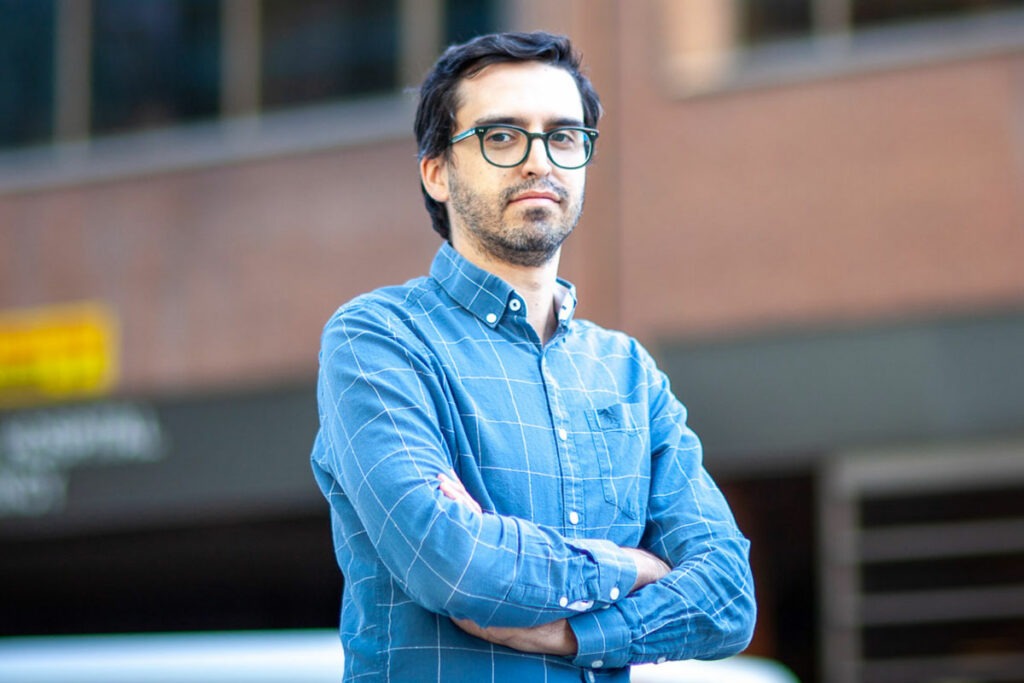Dr. David Gomez’s #OneBurningQuestion: How do we remove barriers to surgery?

From his medical training in Colombia and Australia to his practice in Canada, Dr. David Gomez noticed a common and puzzling theme: barriers to quality surgical care persist across borders, health-care systems and economic realities.
“In Colombia, it’s a mix of private and public health care in a developing country – and that can lead to inequity,” he said. “But in Australia and Canada, where we have public health care and barriers should not exist, I was surprised to see that they still do.”

As a trauma surgeon, he has seen that patients who are new to the country, don’t speak the language of care, or are living with addiction and other health risks, often experience challenges in accessing surgical care.
“I decided to devote my research career to try to not only identify and describe the barriers, but actually have an impact in trying to reduce them in a systematic way,” Gomez said.
Unity Health’s vision is to provide the best care experiences with a focus on those experiencing marginalization. Here, Gomez found a home for his research and medical aspiration. Since then, he has led studies to explore enablers and barriers to timely and quality surgical care.
The discovery
In a recent study published in Transplantation, Gomez and his team examined how often recipients of solid organ transplants are diagnosed with emergency abdominal conditions at least three months after their transplant, and whether they are more or less likely than the general population to die as a result of these conditions.
Patients who have received a heart, lung, liver or kidney transplant are required to take medication to maintain the transplanted organ. This affects their body’s response to infection and makes their care during a subsequent operation more complex. Until this study, there wasn’t a comprehensive understanding of the impact and outcomes of organ transplant recipients who need emergency surgery.
“We were concerned their outcomes may be worse because of that,” Gomez explained.
The team made two important discoveries. First, solid organ transplant recipients are more likely to develop emergency abdominal conditions that require surgery, such as appendicitis and inflammation of the gallbladder. Second, after developing these conditions, solid organ transplant recipients are 1.4 times more likely to die within 30 days of the condition.
The impact
Gomez sees the results of this study as impactful not only for care providers assessing solid organ transplant patients in need of emergency abdominal surgery, but also for the health care system.
“As physicians, we need to a better job of identifying and treating these conditions,” he says. From a system level, right now there is no protocol to determine where a solid organ transplant recipient should receive care. Unlike with stroke or cardiac care, there are no regional centres of excellence or specialization designated for the care of people with solid organ transplants and secondary emergency surgical needs, he explained.
“Emergency general surgery makes up for almost 10 per cent of all hospital admissions,” he said. “Patients who have received a transplant should have a clear plan of where they should receive such care if they need it. We do it for heart attacks, stroke, trauma, but we haven’t done this for high-risk emergency surgery, and now we know these patients are high-risk and require specific pathways.”
Gomez and his team hope this study sheds new light on providing surgical care to solid organ transplant recipients. Knowing they are at higher risk of emergency abdominal conditions and worse outcomes because of them means care teams should be aggressive in investigating and managing patients’ concerns, he says.
The team’s next step is to identify where solid organ transplant patients are most likely to seek out care and work with emergency department, transplant and surgical teams to create guidelines on where these patients should receive care, and whether there can be specialized centres like there are for trauma, stroke, and other conditions.
At the centre of this work is Gomez’s research aspiration: making sure every patient, regardless of background, socioeconomic status, area of residence, or preexisting condition, receives the best care possible, without barriers and when they need it most.
“Being an acute care and trauma surgeon is a challenging and varied career, but it’s also quite satisfying to be able to help patients in what could be one of the worst days of their lives,” he said. “As a health services researcher, it’s also satisfying to provide high quality evidence that will impact policy that can affect patients for generations to come.”
More #OneBurningQuestion articles
- Dr. Darren Yuen: How do we treat the most common issue in kidney disease?
- Dr. Tara Kiran: How can we make patients’ first point of health care better?
- Dr. Sunit Das: How can we turn deadly brain cancer into a chronic and manageable disease?
- Dr. Sharmistha Mishra: What drives pandemics and why?
- Dr. Gaspard Montandon: Can we create pain killers that don’t kill?
- Dr. Joanna Sale: Can we stop devastating hip fractures?
- Dr. Charles de Mestral: How do we stop the most devastating outcome of diabetes and poor circulation?
- Dr. Cilia Mejia-Lancheros: How does mental-health related stigma affect homeless people?
- Dr. Yeni Yucel: Can the eye unlock secrets to ALS?
- Dr. Michael Cusimano: How do we stop injury?
By: Ana Gajic
